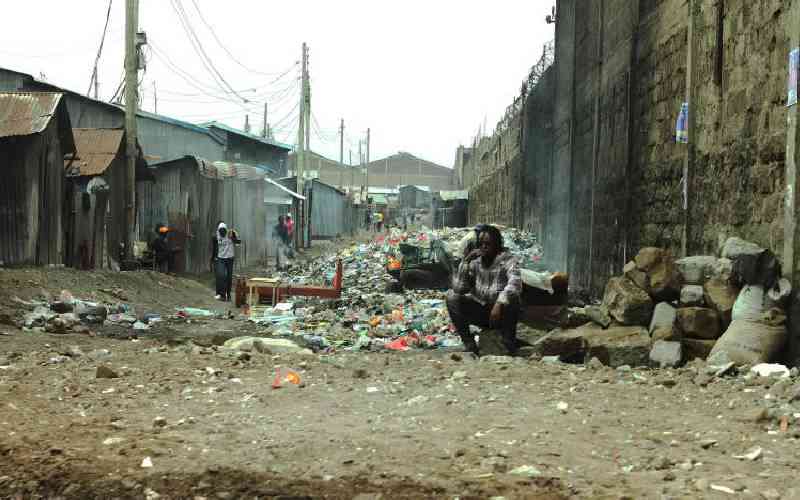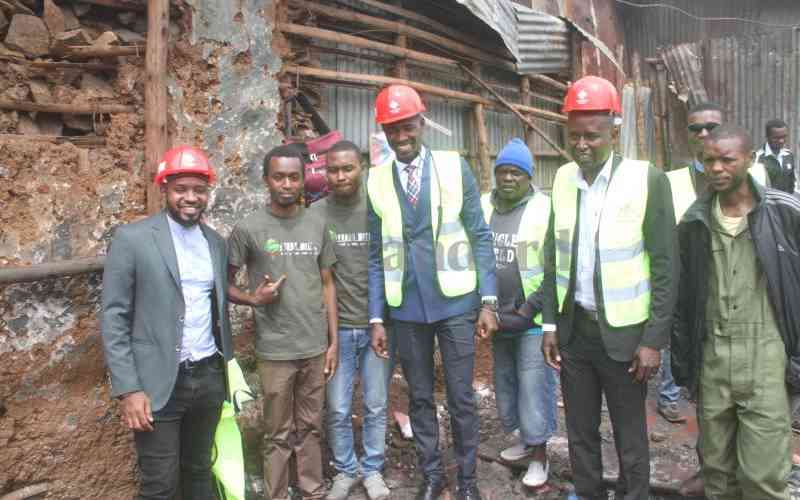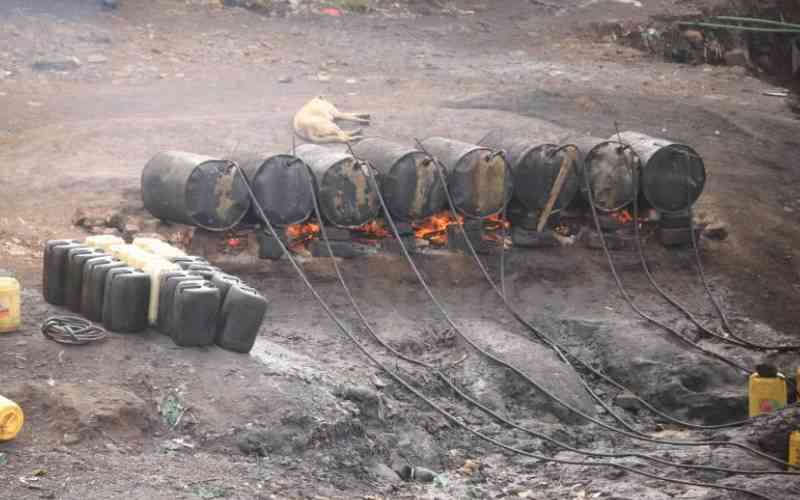
Hundreds of families from the slums who were shipped in truck loads to what was described as the march to the promised land, are now staring at being homeless once again after their low-cost housing experiment hit a rock and is now sinking, fast.
They came in from their humble shacks in Kibera, Mathare, Kayole and Huruma in a journey likened to the Biblical exodus. Jamii Bora Trust, which had set out to build 2,000 two-bedroom houses on 293 acres bought from private owners in Kisaju township, fifty kilometres from Nairobi, had delivered on their dream.
Though it came after years of sacrifice and painful saving from families from the urban poor; given that they had to choose between skipping meals and saving a coin or two, they saw it as a miracle.
The project was mooted in 1998 after the slum residents were asked to form self-help groups on the promise of decent housing units. After more than a decade of savings and a little push from donors, the slum dwellers were finally going to own homes.
They were the lucky few, selected from hundreds of thousands of the population. It was a dream come true for most as they received keys to their new homes in Kisaju, Kajiado County under the Jamii Bora housing project. That was the end of flying toilets for this group. This was the beginning of a new life for them. They would make new neighbours, meet new friends, and also seek new income-generating schemes away from the slum life.
They experienced how it felt to have regular clean water flowing from their taps, solar lighting, clean toilets and bathrooms. They also had a little room for kitchen gardens and space for poultry, transforming their lives from poor slum residents to the lower middle-class.
Benefits
The project also took away the security nightmare that they had come to accept in their previous life. It gave parents privacy given that the houses had at least two bedrooms. But six years down the line, all the songs have gone silent.
Most families are staring for the first time at the prospect of returning to the slums after it became too expensive to meet their monthly repayments. Several have received letters from auctioneers and they know it is only a matter of time before they lose their homes.
Interviews with more than a dozen of the beneficiaries revealed that the project is on the rocks after the bank slapped them with interests rates they say are too high.
Philip Mulee, one of the beneficiaries says their group knew nothing about the intricacies of a mortgage. He regrets having left the entire home-buying process to women. “At first we thought it was just another of those women projects that do not go so far.”
But when we realised it was true we got involved. But it was too late because our wives had already committed to most of the things. It was a a project targeting women anyway,” Mulee regrets. He says that some of the families were semi-illiterate and the prospect of owning a house was too good to think about the ‘what ifs’.
It was fronted by Ingrid Munro, who was the founder of Jamii Bora, the managing trust then. They now regret the trust they gave to the project without paying attention to the fine print of what they were getting themselves into.
Some of the beneficiaries had been with Ms Munro for 26 years, when they were part of African Housing Finance (AHF). There was a second group of beneficiaries who became members of Jamii Bora after the revival of the earlier outfit in 1999.
Stay informed. Subscribe to our newsletter
It was expected that 10,000 people would settle in these houses when the project was done. But just a handful fulfilled all the requirements needed before receiving the keys.
“Some families did not understand the legal implications of the papers they were meant to sign. But at that time, all we cared for was getting a home. We also had come to trust Igrid and we had no reason to doubt that she did not mean well for us,” Mulee says.
To benefit from the project, women were required to form groups of five and save at least Sh10 every day. In ten years, the group had grown to over 230,000 members. First they had to register themselves at the cost of Sh1,000 to qualify for a house allocation.
They then had to participate in the manufacture of building materials to bring down the cost of the houses. One of the groups who have sought the services of a lawyer claim that upon completion of the houses, they were asked to purchase them at Sh350,000.
Complaint
“Upon completion of the houses, you asked our clients to purchase them at Sh350,000, even though you knew they were unable to,” a protest letter to the Jamii Bora Charitable Trust, complaining against the arbitrary increase of the rate of interest, reads.
The group argues that in order to appear philanthropic, the charity offered them a loan facility for which they were to pay an interest rate at a flat rate of nine per cent per annum.
Then they were later informed that they would be required to pay a 10 per cent deposit. Several fell out at this stage. Only a handful could raise the deposit - Sh30,000 to Sh45,000 then - to qualify to be allocatted a house.
“We signed all documents given to us without question. Some of the documents were signed in the middle of the night. All we knew was that a miracle had just happened,” he adds. Things turned for the worse when the bank hiked the interest rates from nine per cent to 20 per cent.
At this rate, most could not afford to pay and they argued that it was intended to make it impossible for them to redeem their houses and those who could would spend the rest of their lives servicing the interest.
One of the contracts signed between a beneficiary and City Finance Bank in 2008 reveals how the project was set to fail from the start having ignored the realities of a community that had never known a regular income.
Under the deal, residents were given a Sh350,000 housing loan repayable in 20 years (240) months. The loan attracted installments of Sh2,888 from the first month including interest. This amount was increasing by Sh10 every month until the final installment of Sh5,328.
Any default would attract a five per cent penalty per annum. The bank was at liberty to vary this rate at its discretion. “In the event of default in meeting your obligation for whatever reason, the whole facility then becomes payable on demand at our sole discretion and any cost including legal fees disbursements incurred by us towards the recovery of the debt outstanding shall be on your account,” the contract reads in part.
Now, most argue that they did not understand what they were getting themselves into and are seeking the services of lawyers too late in the day to help them navigate the legal landmine.
In correspondence with the bank, the group claims it was ‘cunningly tricked’ into signing agreements at 11pm in the night without allowing members to read or ask someone else to read for them what was contained in the agreement, even when the bank knew some were illiterate.
The landmark project was to be a model on how to transform lives of poor slum dwellers. A resettlement survey conducted after they started living in their new homes showed that their children started performing much better since they had space to do homework.
The study also noted that there were improved relationships between spouses now that they had a home.
Cracks started widening between the group and the management two years ago when it became clear that they will need a lot more money than they thought to buy the houses. Some can no longer afford the monthly repayments after they became too expensive and have fallen out with their benefactors.
This paper saw several letters from auctioneers served on different families warning that they will be paying them a visit soon. The auctioneers are threatening to take anything from used plastic chairs, floor carpets, television sets, sofa set fabric, wooden wall units and any other home appliances they can find.
Our efforts to get a comment from Ingrid Munro had borne no fruit by the time of going to press.
 The Standard Group Plc is a
multi-media organization with investments in media platforms spanning newspaper
print operations, television, radio broadcasting, digital and online services. The
Standard Group is recognized as a leading multi-media house in Kenya with a key
influence in matters of national and international interest.
The Standard Group Plc is a
multi-media organization with investments in media platforms spanning newspaper
print operations, television, radio broadcasting, digital and online services. The
Standard Group is recognized as a leading multi-media house in Kenya with a key
influence in matters of national and international interest.
 The Standard Group Plc is a
multi-media organization with investments in media platforms spanning newspaper
print operations, television, radio broadcasting, digital and online services. The
Standard Group is recognized as a leading multi-media house in Kenya with a key
influence in matters of national and international interest.
The Standard Group Plc is a
multi-media organization with investments in media platforms spanning newspaper
print operations, television, radio broadcasting, digital and online services. The
Standard Group is recognized as a leading multi-media house in Kenya with a key
influence in matters of national and international interest.








